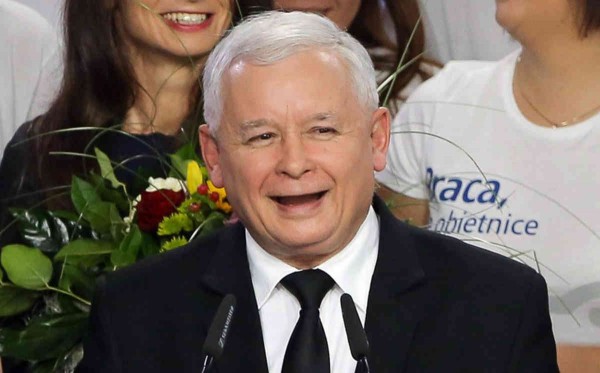
Run by Jaroslaw Kaczynski, the twin brother of Poland’s late president Lech, PiS secured 39.1 percent of the vote, enough to govern alone and well ahead of the incumbent, staunchly pro-EU Civic Platform (PO) on 23.4 percent, said pollster Ipsos.
If the exit poll is correct, the victory by PiS would be the biggest in terms of seats by a single party since Poland held free elections after shedding communism in 1989 — marking a decisive swing to its brand of social conservativism mixed with left-leaning economics in the country of 38 million people.
It would also be the first time that the socialist grouping that grew out of the pre-1989 communist party failed to win seats in parliament.
A triumphant Kaczynski, whose party immediately signalled plans to reap new revenues from next year with a tax on bank assets, declared victory.
“We will not kick those who have fallen… We need to show that Polish public life can be different,” Kaczynski told jubilant supporters at his party headquarters in central Warsaw.
Prime Minister Ewa Kopacz of PO conceded defeat. Poland has seen its economy, the largest in ex-communist central Europe, expand by nearly 50 percent in the last decade, with the pro-market Civic Platform focusing on trying to make the most of EU aid and combining green field investment with fiscal prudence.
But pockets of poverty and economic stagnation remain, and PiS was able to exploit growing frustration in some areas that the spoils of economic success are not more evenly shared.
Distrustful of the EU and an advocate of a strong NATO stance in dealing with Moscow, PiS opposes joining the euro zone any time soon and promises more welfare spending on the poor.
Tensions ahead
The election of PiS likely means that Poland will join ranks with Hungary and Slovakia in opposing relocation of migrants from the Middle East and North Africa, deepening divisions in the EU, where Germany’s Angela Merkel in particular has advocated a more open approach.
Kaczynski, a long-time fan of Hungary’s right-wing Prime Minister Orban, has said Muslim migrants threaten Poland’s Catholic way of life. Earlier this month he was accused by some media in Poland of fanning racism when he said they would bring new diseases and parasites to Poland.
The migrant crisis has led to a boost in support for hard-right parties in countries including Sweden and the Netherlands.
On the campaign trail, Kaczynski and other PiS leaders sought to tap into nationalist sentiment tied to fears over immigration, particularly among young voters.
“The victory by PiS is part of a wider shift in Europe, of a return to national values,” said analyst Aleksander Smolar. PiS advocates a robust Western approach towards Russia, especially following Moscow’s 2014 annexation of the Crimean peninsula in Poland’s eastern neighbour Ukraine.
That might complicate any future attempts at bridge-building between the EU and Russia, currently the target of Western sanctions imposed over the Ukraine conflict.
Markets have eyed the possible victory of PiS with growing concern in the final days ahead of the vote, with the zloty hitting a nine-month low. Economists said PiS plans to tax banks threatened the flow of cash into the economy, while welfare spending promises signalled less fiscal prudence.
A senior PiS official said on Sunday the party wanted to tax banks’ assets from next year.
“One of the first economic decisions of the new government will be to submit an amendment of next year’s budget,” said Zbigniew Kuzmiuk, who is tipped to play a major role in shaping the new government’s economic policies.
“We want, probably as of January 2016, to introduce two taxes that are important for us, including a tax on banks – it will be a tax on assets with a rate of 0.39 percent – and a tax on supermarkets,” he said.
He said the government would be committed to maintaining an overall deficit below three percent of national output in line with EU guidelines.
FRANCE24/REUTERS

Leave a Reply
You must be logged in to post a comment.